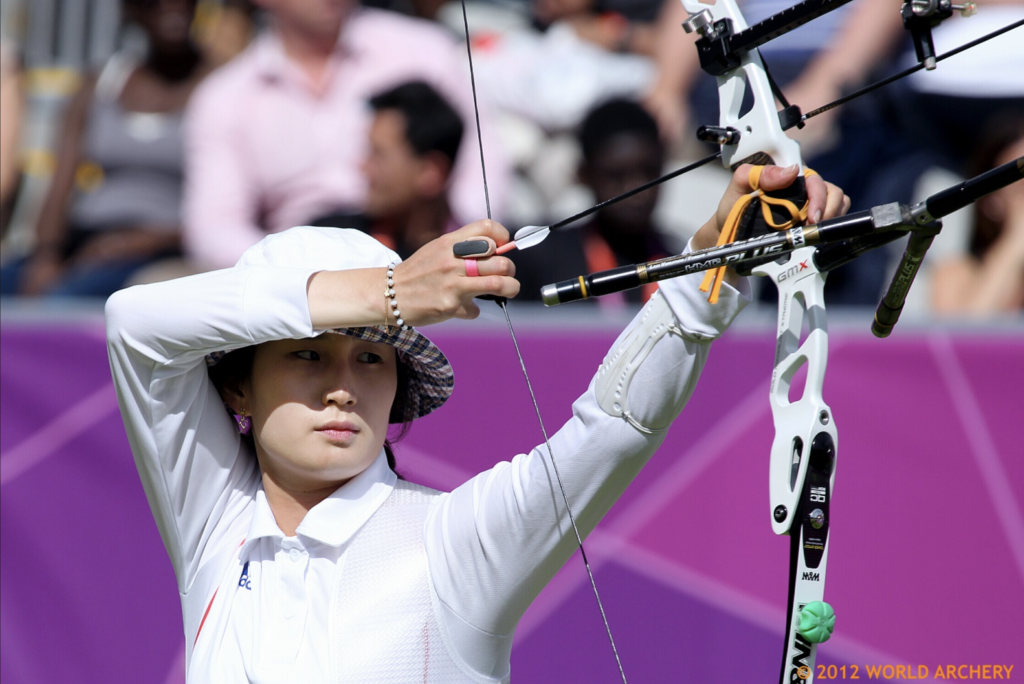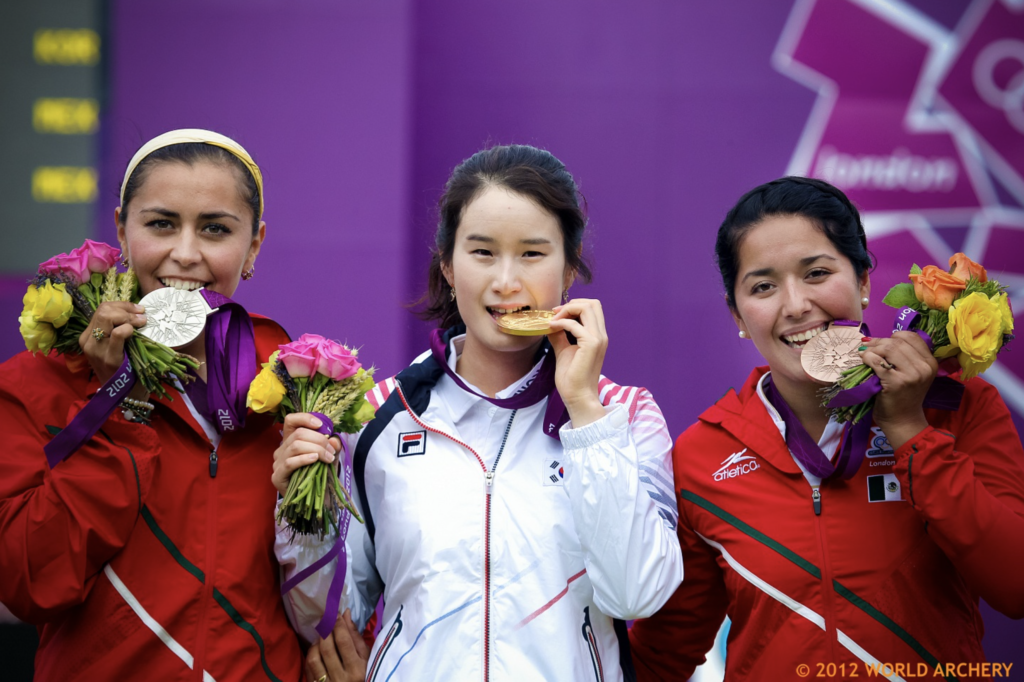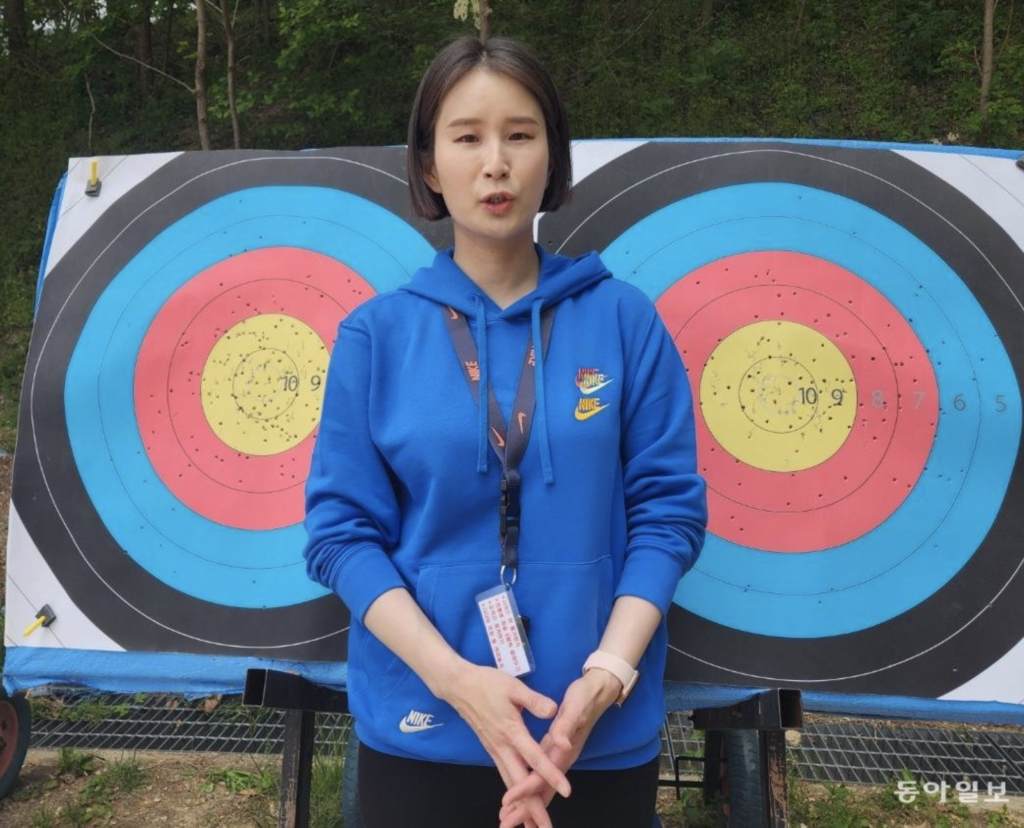by Kristina Dolgilevica
Bow takes a closer look at South Korea’s greatest
In April, recurve archery fans were thrilled to see the return of “the recurve queen” to the Korean squad of 2023. Multiple Olympic champion Ki Bo Bae last appeared on the international circuit in 2017, when she earned her final World Cup gold in Rome, the third of her career. Since then, she is said to have been thinking of retiring, at least as an athlete. What will the veteran 35-year-old do now – and how is she perceived in her own country?
Rise to Fame
Like many Korean children, Ki Bo Bae started archery as an extracurricular activity in middle school, around the age of twelve, with little thought of becoming a professional athlete. But her teacher brought her talent to her parents’ attention and suggested she should compete. By the end of middle school Ki had won three gold medals in one of country’s most important national youth sports festivals and was selected as a junior representative. This kickstarted her career. The gold medal sweep continued with her winning the team gold at the Junior World Championship of 2004 at Lilleshall. Around this time her school grades began to suffer, and it was said that her parents were thinking of discouraging her from pursuing the sport. However, Ki Bo Bae pressed on, collecting gold after gold in individual and team events at the World University Games, the Asian championships, and World Cups. This culminated in her becoming the double Olympic Champion at the 2012 London Olympics. It seemed that wherever she went, particularly in the solo exhibitions, the gold was hers – “The Ki Bo Bae Effect”. There is no doubt that if there had been a mixed team event at that time, she would have taken that too.

National Pride and its rewards
In South Korea, unlike some other countries, archery is a source of national pride, handsomely rewarded both by the government and private business. Following the Korean War of 1950-1953, and the division of the country, the South remained a military dictatorship until 1980. However, with the installation of a new president came new policies and an influx of wealth and resources, and the divided nations diverted their rivalry to sport. South Korea focussed on developing new generations of athletes from the ground up. In schools, the boys were encouraged to practice taekwondo, the girls archery.
Since then, both government and business, the Hyundai Group at the helm, have acted as patrons of the sport, generously and strategically investing in the infrastructure and the development of archery, and offering handsome rewards for medals earned on international podiums. For example, for winning an Olympic gold medal in archery, in addition to other big monetary prizes, an archer will also receive a lifetime monthly pension of 1 million Korean Won (around £600). Both silver and bronze podiums are also rewarded. The Korea Times reported that, for Rio 2016, the Korea Archery Association rewarded each individual gold medallist with an equivalent of £120,000 and around £90,000 was paid out to each team member for winning the team gold. With extra pressure on the unbeaten Korean women, the KAA is set to raise its pay-outs even higher for the Paris Games. Such rewards for success are, unsurprisingly, a further incentive for many professional athletes. Ki Bo Bae has earned a total of four Olympic medals: two gold, one individual, one team event at London in 2012; and one team gold and an individual bronze at Rio in 2016. For each gold she will receive a lifetime pension. But this of course does not mean she should retire.
Not good enough?
A year ago, during her interview with World Archery, Ki Bo Bae spoke of gaining a lot of fans following her brilliant win in London. She received one of the highest forms of honour for a sportsperson following her achievements; the International Archery Centre at Gwangju, the capital of archery in Korea, a range used for the second stage of the 2022 Hyundai Archery World Cup, was named after her. On the one hand, this signifies the importance of her achievement as an individual archer at the Olympic Games. On the other, it confirms her celebrity status in the country. However, the fact that it took ten years for her to receive full recognition for her 2012 achievements begs the question, why?
The issue was raised in the WA’s article, that despite the massive international and domestic fanbase, Ki was not as celebrated as the other successful women in the Olympic lineage, Kim Soo Nyung (52) and Park Sung Hyun (40). Like Ki, both women, in addition to other Olympic podiums, also took one individual and two team golds at the Olympics in their careers. It is hard to judge why she was not considered their equal. It is difficult for an outsider to pin down the reason that there seemed to be a feeling that she somehow wasn’t “good enough”.
It seems that Ki might have drawn the short straw as, compared to her predecessors, her success occurred in an era of social media, where information travels fast and speculation is rife. One need look no further than the 2020 Games, where there was public outrage fed by the anti-feminist groups because An San, the triple gold Tokyo 2020 medallist, had worn her hair cut short! Today, there seem to be two different standards by which the Korean archers are measured, one based on international success, another on domestic, the second of which Ki was perceived not to have achieved following her massive international wins. Reportedly, Ki’s failure to top the charts in the national preliminaries, and the subsequent malicious public criticism, left her devastated, demonstrating the level of pressure and scrutiny to which these athletes are subjected.
The London Olympics of 2012 was the first time the tie break was introduced. The gold medal event culminated in a one arrow shoot off against Mexico’s Aida Roman. Both Ki and Roman shot 8s – Ki a high 8, Aida a wide left. Ki walked away with the medal but was also shamed by her countrymen for not finishing it in the “Korean” style – inside the gold. An influential celebrity commented that she had been “lucky to win it”! It did bring her down, and it did feel as though she was still somewhat hung up, “ashamed” even, for not having shot a “good score” in the tie break – as she said to WA in 2022. It is part of the South Korean mentality, which demands nothing less than perfection in its heroes and heroines.
Out of the slump
Narratives do change, and a gold claimed for the nation is still a gold. Domestic commentators now speak favourably, and the media describe Ki Bo Bae as a natural team leader, and are proud of listing her many wins and successes starting from her school years: “She appeared like a comet in 2010 and earned the title of monster rookie”. However, the pressure is on for the Korean women: to date, the women’s team remains unbeaten, winning their ninth consecutive team gold at Tokyo in 2020. Winning a tenth in Paris 2024 would be a national triumph. Aside from using Ki Bo Bae to inspire and boost the morale of those who will be shooting in Paris, one of her biggest contributions to archery, a point that is usually dismissed, is that she brought the individual gold back to Korea after a brief interruption in the gallery of South Korean medals. The individual gold medal streak starting from the LA 1984 Games was interrupted by Team China at Beijing 2008. What Ki Bo Bae did was more than win ‘just another gold’ – she lifted the Koreans out of the ‘uncharacteristic slump’, and with it, their morale. Though she did not win another individual gold at Rio in 2016, she took gold in the team event. Following her final international podium in 2017, Ki Bo Bae married and had a daughter. Apart from attending to her education – a Masters, followed by a PhD in physical education – Ki began to work as an Olympic commentator, speaking proudly of the women from her alma mater Gwangju Women’s University, including Choi Mi Sun and An San.

“… she lifted the Koreans out of the ‘uncharacteristic slump’, and with it, their morale.”
Next Chapter
Later in the WA interview Ki spoke of her interest in developing an elementary school archery programme for children, alluding to retirement, only to reappear, much to everyone’s surprise, at the following year’s national trials. “When I think of the Paris Olympics, it gives me headache”, said Ki to WA, referring to the amount of hard work it takes to make the team. She qualified overall eighth in the notoriously arduous national trials at Gwangju, finishing out of the top four. This means that she will remain on the squad but will not be representing Korea internationally – though this is not entirely off the cards.

Finding current information on Korean athletes can be problematic; there are few reliable sources. South Korean mainstream media reports are often hearsay. Successful South Korean sporting athletes are treated like celebrities; through their sporting achievements they attain a certain social status. Korean society is still largely hierarchical – social standing and achievement matter very much. Moreover, despite the obsession with social media and K-culture, many famous people in South Korea tend to be secretive about their personal lives. Not everyone wants the world to know what they have had for breakfast. However, on March 3rd this year, Ki Bo Bae was speaking about her plan for an archery course to a group of students at Seoul National University. From there the rumour has spread that she would be appointed lecturer for the Liberal Arts “Archery” class for university freshmen. Many messages and screenshots appeared claiming a leaked teaching file bore her name. Messages read:” Ki Bo Bae is world class”, “Professor Ki Bo-bae’s archery is showing a 10:1 competition rate” and so on. The university did not officially confirm the tutor for the module; however, the entry rate for the class speaks volumes of the “Ki Bo Bae effect” – both 9am and 11am lectures exceeded 300 entrants as against a normal class size of 30. Either way, Ki Bo Bae is here to stay.

